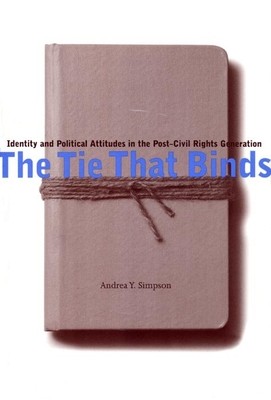
- We will send in 10–14 business days.
- Author: Andrea Y Simpson
- Publisher: New York University Press
- ISBN-10: 0814781012
- ISBN-13: 9780814781012
- Format: 15.2 x 22.9 x 1.6 cm, hardcover
- Language: English
- SAVE -10% with code: EXTRA
Reviews
Description
What does it mean to be black in a nation increasingly infatuated with colorblindness? In The Tie That Binds, Andrea Y. Simpson seeks to answer this crucial question through the prism of ethnic and political identification.
Historically, African Americans have voted overwhelmingly Democratic in governmental elections. In recent years, however, politically conservative blacks--from Clarence Thomas to Louis Farrakhan to Ward Connerly-have attracted much of the media's gaze. What is the nature of black conservatives' constituency, and is it as strong and numerous as conservatives would have us believe? To what extent, if at all, does black conservatism stem from a weakened sense of collective racial identity?
Simpson tackles the peculiar institution of black conservatism by interviewing college students to determine their political attitudes and the ways in which these are shaped. The result is a penetrating interrogation of the relations between political affiliation, racial identity, and class situation.
EXTRA 10 % discount with code: EXTRA
The promotion ends in 17d.18:29:24
The discount code is valid when purchasing from 10 €. Discounts do not stack.
- Author: Andrea Y Simpson
- Publisher: New York University Press
- ISBN-10: 0814781012
- ISBN-13: 9780814781012
- Format: 15.2 x 22.9 x 1.6 cm, hardcover
- Language: English English
What does it mean to be black in a nation increasingly infatuated with colorblindness? In The Tie That Binds, Andrea Y. Simpson seeks to answer this crucial question through the prism of ethnic and political identification.
Historically, African Americans have voted overwhelmingly Democratic in governmental elections. In recent years, however, politically conservative blacks--from Clarence Thomas to Louis Farrakhan to Ward Connerly-have attracted much of the media's gaze. What is the nature of black conservatives' constituency, and is it as strong and numerous as conservatives would have us believe? To what extent, if at all, does black conservatism stem from a weakened sense of collective racial identity?
Simpson tackles the peculiar institution of black conservatism by interviewing college students to determine their political attitudes and the ways in which these are shaped. The result is a penetrating interrogation of the relations between political affiliation, racial identity, and class situation.


Reviews